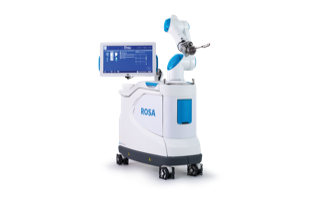James B. Kyle MD
Orthopedic surgery
Robotic Total Knee Replacement
For decades, knee replacement has been an effective solution for
patients with severe knee arthritis to reduce pain and improve knee
function. In fact, it is often considered one of the most successful
procedures in all of medicine. Over the years, there have been many
advances in how we approach knee replacement that continue to improve
the results for patients. Robotic surgery is one of the latest advances
in knee replacement technology, and its capabilities can offer surgeons
a wealth of information over a traditional knee replacement procedure.
Dr. James B. Kyle is a fellowship trained and board certified orthopedic
surgeon specializing in hip and knee replacement. He also specializes in
revision hip and knee replacement. Dr. Kyle completed his fellowship
training at Harvard’s Brigham and Women’s hospital. A native of Welsh,
LA, Dr. Kyle brings his expertise and training to patients in Lafayette
and the surrounding communities. Dr. Kyle previously practiced as a
veterinarian, but decided to go back to school to become an orthopedic
surgeon to help people with hip and knee pain regain mobility.
What Is a Robotic Knee Replacement?

Though the term “robotic knee replacement” might make it sound like your
new knee will be robotic, or that a robot is performing your surgery, it
is actually a tool that Dr. Kyle uses to perform the surgery.
There are a few different robotic knee replacement systems available on
the market. Dr. Kyle uses the ROSA (Robotic Surgical Assistant) knee
replacement system. The ROSA system helps him create a detailed plan for
the surgery before ever making a cut, and also gives him real-time
feedback during the procedure in order to place the knee implants in a
way that best fits the patient’s anatomy. ROSA provides real-time
objective data of the patient’s anatomy, which is combined with Dr.
Kyle’s subjective assessment of the knee to make the best possible
surgical decisions for each individual patient. Robotic surgery can also
allow Dr. Kyle to avoid removing old hardware from the knee that may
have been in the way with traditional knee replacement technique.
In short, robotic knee replacement provides Dr. Kyle with information
that would not be available with a traditional, non-robotic knee
replacement. The surgical plan is customized to each individual patient
and may lead to better results for the patient.
Contact Dr. Kyle’s office today to learn more about robotic knee replacement and schedule a consultation.
Robotic Knee Replacement Procedure
Dr. Kyle will only consider knee replacement surgery if nonsurgical
treatment methods like physical therapy, bracing, and injections are not
effective. While he does not want his patients to be in pain, only
patients with very severe knee arthritis will see real improvement with
knee replacement surgery. Early-stage and minor cases of arthritis can
often be effectively managed with nonsurgical treatment.
The vast majority of Dr. Kyle’s patients are eligible for knee
replacement surgery with the ROSA knee replacement system. During a
robotic knee replacement, Dr. Kyle removes the damaged portions of the
knee joint and replaces them with implants. Knee implants are designed
to improve knee function and reduce pain caused by severe knee
arthritis. The implants are made of metal, and a plastic spacer is
inserted between the two components to allow the joint to glide
smoothly.
Recovering from Robotic Knee Replacement
Following a robotic knee replacement procedure, Dr. Kyle’s patients typically stay overnight in the hospital for observation. However, the vast majority of patients are able to return home the next day. It is important that patients prepare for the return home by having a good support system at home, either through family and friends or home health services. Patients should also make the following preparations to create a safer at-home environment after surgery:
- Remove loose area rugs and cords that might cause a fall.
- Place frequently used items at arm level.
- Make sure stair rails and banisters are secure
- Use small lights in any darkened area where you may walk at night.
- Remove any clutter that may impede a walker or cane.
- Arrange for pet care, if needed.
- Have footwear with non-skid soles.
- Arrange transportation for postoperative visits (patients are not permitted to drive while taking prescribed narcotics).
Dr. Kyle provides all of his patients with a detailed, comprehensive
guide on everything they need to know before and after surgery.
Download Dr. Kyle’s Joint Replacement Surgery Guide >>
Patients work with physical therapy after surgery, and in some cases may
begin “pre-hab” before surgery. Physical therapy helps to improve range
of motion and strength in the new knee. Dr. Kyle’s practice offers 2
physical therapy locations, which is both convenient for patients and
allows Dr. Kyle to communicate with the physical therapists to monitor
the recovery process.
Most patients are able to return to most everyday activities within 6-8
weeks of surgery. Dr. Kyle will advise when it is safe to return to
certain activities. Patients will continue to see improvement in the
knee up to a year after surgery.
Robotic Knee Replacement in Lafayette,LA
Dr. James Kyle is a board certified orthopedic surgeon with fellowship
training in knee replacement surgery from Harvard’s Brigham & Women’s
Hospital. A native of Welsh, LA, Dr. Kyle brings his expertise to
patients in Lafayette and surrounding communities to help patients with
severe knee arthritis regain mobility. Dr. Kyle offers robotic knee
replacement because it can add objective real-time data to his
subjective assessment of ligament tension and range of motion within the
knee. And this is possible before ever cutting the bone. If you would
like to learn more about robotic knee replacement or schedule a
consultation with Dr. Kyle, please call our office at
337-235-8007 or fill out our
contact form.

